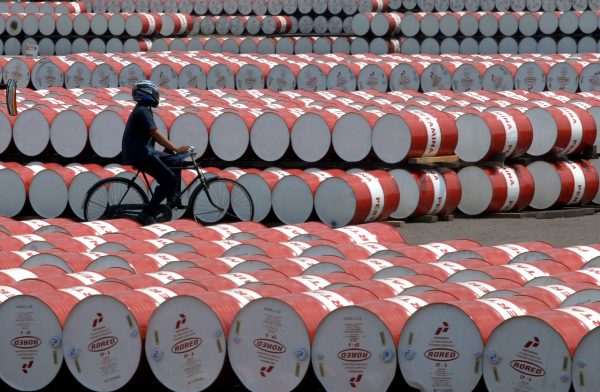Indonesia suspended its membership of the Organization of Petroleum Exporting Countries (OPEC) in 2009 due to this dramatic shift in its oil trading status. Because of the widening gap between supply and demand it will be difficult for Indonesia to return to OPEC in the future.
From the supply side, Indonesia’s total oil reserves are now only four billion barrels. This accounts for approximately 1.2 per cent of the world’s oil production. Indonesia is ranked 21st among the world’s oil producers, with reserves far below the giants Iraq (140 billion barrels), Iran (160), Saudi Arabia (270) and, the largest, Venezuela (300). Indonesian reserves are still below Qatar (25), Algeria (12), Angola (9) and Ecuador (8).
But the oil business in Indonesia is still attractive. Net income (profit after tax) of Pertamina, the state- owned oil company, was US$3 billion in 2013. This was far above the most profitable bank in the country—Bank Rakyat Indonesia (BRI) — with US$2 billion. As a benchmark, the biggest private holding company, Astra International, also booked a net income record, of almost US$2 billion, in 2013. Astra International consists of 178 subsidiaries in areas that include the automotive sector, finance and banking, agribusiness, mining, infrastructure, heavy equipment, logistics, and the like.
Pertamina is the second-largest crude oil producer in Indonesia after Chevron Pacific Indonesia, which is a subsidiary of America’s Chevron. In 2013, Pertamina — with revenues totalling US$70.9 billion — ranked number 122 in the Fortune Global 500 list of companies. It currently produces 196,000 barrels of oil per day compared with 189,000 in the previous year, and accounts for about 20 per cent of total Indonesian production. Other significant producers are Chevron (about 47 per cent), Total (10), Conoco Phillips (7), CNOOC (4), Chevron Indonesia (4), PHE-ONWJ (4) and Mobil Cepu (3).
In brief, the oil business is still big business in Indonesia — especially in light of declining prices for commodities such as coal and palm oil over the last few years. Unfortunately the financial sector, particularly the banking industry, has had only a minor role in the oil sector to date. There are two reasons for this. First, most oil operators in Indonesia are foreign companies. Only Pertamina and a relatively small oil and gas private company named Medco, owned by Arifin Panigoro and family, are domestic players. Other oil and gas companies are from the US, UK and China.
Second, most Indonesian banks have insufficient experience and exposure in oil sector lending. Indonesia has 119 commercial banks, many fewer than the 250 that operated in the pre-Asian financial crisis period (before 1997). Lending in the banking industry falls into four categories: corporate lending (lending for big companies, which is usually above US$20 million), commercial lending (usually above US$10 million), consumer lending (for consumption purposes), and the smallest lending category for micro, small and medium enterprises.
Typically, most banks are involved in consumer, commercial, and small- and medium-enterprise lending. They enjoy a huge margin of interest and high profitability. Indonesia is well known as a ‘heaven’ in the region for net interest margin (NIM) and profitability. Providing lending for small and medium enterprises can attract an interest rate of more than 20 per cent, compared with less than 10 per cent for corporate lending.
Only two state banks have experience in corporate lending: Bank Mandiri and Bank Negara Indonesia (BNI). Since 2013 both state banks have been involved in many transactions in the oil business. BNI, for instance, has been appointed as a trustee and paying agent to handle the sales contracts of liquefied natural gas (LNG) and liquefied petroleum gas (LPG) in Mahakam Block, East Kalimantan. Under this appointment, all payments generated from sales should be paid to the seller’s account in BNI. The estimated gas sale value is approximately US$18 billion for a period of 10 years. As a result, BNI becomes the first state bank entering the trustee and paying agent business, whereas in the past all transactions were handled by foreign banks.
The oil sector is a huge business and provides a lot of opportunities for national banks, particularly state banks such as Bank Mandiri, BRI and BNI. In 2013, oil and gas industry transactions reached a total of US$57.8 billion. Major business included oil transactions (US$31.3 billion), pipeline gas (US$12.4 billion), and both LNG and LPG (US$14.1 billion).
These data show that the oil industry is not considered a ‘sunset industry’ for the banking sector. Increased demand and the increased oil price are two factors that indicate that the oil business will continue to be attractive and Indonesian banks should have greater involvement its business. From the macroeconomic point of view, greater volumes of foreign currencies handled by local banks will help stabilise the rupiah. From the banking industry point of view, greater exposure will help state banks be more competitive regionally.
Indonesian commercial banks, particularly state banks, need to strengthen capital (to mitigate the risks in corporate lending) and elevate their capacity to handle ‘sophisticated’ business. These are two key factors if Indonesia’s banks are to increase their role in the very dynamic oil business.
Tony Prasetiantono is Director of the Center for Economic and Public Policy Studies, Universitas Gadjah Mada, Indonesia, and Independent Commissioner, Permata Bank, Jakarta, Indonesia.
This article appeared in the most recent edition of the East Asia Forum Quarterly, ‘The state and economic enterprise’.

